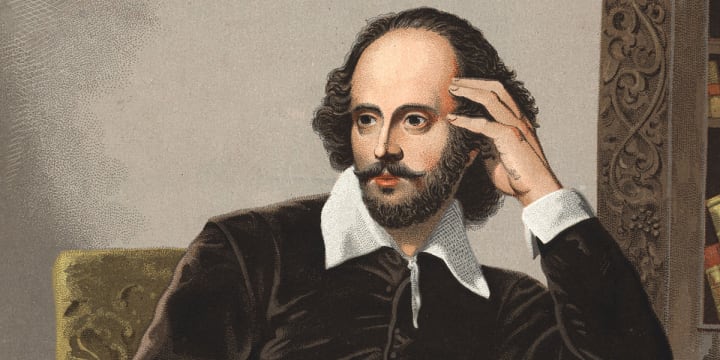Was Shakespeare Gay?
Shakespeare’s sexuality has been under question for decades. Could it be that the great Elizabethan poet was gay.

Shall I compare thee to a summer's day?Thou art more lovely and more temperate...
The world knows this as one of its best loved and most tender love poems. The world, for the most part, does not know that the lovely party on the other end of Shakespeare's line was not a demure, beauteous maiden at all. The lovely party in this case—and in 126 of Shakespeare's 154 sonnets—was a rich, spoiled, but irresistibly beauteous boy.
Two loves have I...The better angel is a man right fairThe worser spirit is a woman, colour'd ill.
The world in general may neither know nor care about Shakespeare's amorous preferences, but the literary world seems both to know and to care very much indeed. In the centuries since Shakespeare's death, no aspect of his personality has provoked more acrimonious controversy than the question of his sexuality.
Nearly 2,000 books, articles, and treatises, embodying the opinions of such august literary personalities as Coleridge, Keats, Goethe, Wilde, Butler, Shaw, Joyce, and Gide, have been published on the subject. And no work of Shakespeare's—with the possible exception of Hamlet—has received greater attention than the opus that brought forth all this discussion: his sonnets.

Photo via Art Sheep
A Look at His Sonnets
First published by T. Thorpe in 1609—most probably without Shakespeare's authorization—the sonnets were soon unofficially, but effectively, suppressed. Whether the suppression was brought about by the authorities, by the young man to whom they were addressed, or by Shakespeare himself (homosexuality at the time was a crime punishable by death) is not known. But the sonnets disappeared so completely from the scene that 30 years after the first publication John Benson, a London publisher, felt safe in publishing them again in a "first edition."
Being a practical man, eager to avoid offending his readers and determined to prevent another suppression, Benson changed the masculine pronouns to feminine, gave the sonnets misleading titles, changed their order, "corrected" a few crucial words, and otherwise spared no effort to make them appear as if they were all addressed to a woman. Of course, not everybody has wished to restore Shakespeare to the more comfortable world of the heterosexual. Many have found in the sonnets irrefutable evidence of Shakespeare's homosexuality. For them, the last word on the subject was, and still is, Oscar Wilde's The Portrait of Mr. W. H., in which the relationship is brilliantly described as a homosexual liaison between Shakespeare and a delicate young male actor who, in the fashion of the period, played the female roles in his company. Many established writers on both sides of the sexual fence, including Gide and Joyce, found Wilde's exposition the most convincing.
Among the numerous candidates suggested for the role of the lovely boy were, at one time or another, two of Shakespeare's brothers, his sonHamnet, who died at the age of 11, the Earl of Essex, the Earl of Pembroke, the Earl of Southampton, and... Shakespeare himself!
However, there are only two historical personalities who can be seriously considered for the role: the Earl of Pembroke (George Bernard Shaw's favorite candidate), who befriended Shakespeare in court, and the Earl of Southampton, who was Shakespeare's patron. The fact that Venus and Adonis and The Rape of Lucrece were warmly and sycophantically dedicated to Southampton gives him the edge.
Whoever the lovely boy was, the poet felt rather strongly about him:
For nothing this wide universe I call,Save thou, my rose; in it thou art my all.And he confessed he was subjugated by his love for the boy:Being your slave, what should I do but tendUpon the hours and times of your desire?
But the boy's behavior was somewhat short of total reciprocity, and the effect upon the poet was heartbreaking:
... my love... keeps mine eye awake...For thee watch I, whilst thou dost wake elsewhere,From me far off, with others all-too-near,So shall I live, supposing thou art true,Like a deceived husband...
The relationship, which according to the sonnets lasted about three years, could not be kept secret, and even in comparatively liberal Elizabethan England it was considered scandalous. To withstand the pressure of social censure, the poet needed—and apparently received—the moral support of his lovely friend:
Your love and pity doth the impression fillWhich vulgar scandal stamp'd upon my brow;For what care I who calls me well or ill...? You are my all-the-world, and I must striveTo know my shames and praises from your tongue...
Feeling that his own effusions might well have been responsible for the gossip, the poet made this promise:
... in my tongueThy sweet beloved name no more shall dwell,Lest I, too much profane, should do it wrong,And haply of our old acquaintance tell.
Society's sanctimonious disapproval sometimes made Shakespeare cynical:
'Tis better to be vile than vile esteem'd,When not to be receives reproach of being...But he submitted in the face of unyielding reality to public conformity, and begged his friend—for the sake of his own good name, as well as for the poet's love—to follow suit:
Let me confess that we two must be twain,Although our undivided loves are one...I may not evermore acknowledge thee,Lest my bewailed guilt should do thee shame;Nor thou with public kindness honour me,Unless thou take that honour from thy name:But do not so; I love thee in such sort,As, thou being mine, mine is thy good report.
The poet suggested that even after his death it would be prudent for the young man to keep his silence:
... let your love even with my life decay,Lest the wise world should look into your moanAnd mock you with me after I am gone.
The tone of the sonnets to the boy was always gentle, intimate, and warm. Even when the poet chided the youth for his narcissism and warned him about his promiscuity, the words were tender and whisperingly caressing. It was always the language of love. And towards the end of the relationship, when the poet, becoming more pursued than pursuing, gradually broke off the liaison, he carefully avoided recriminations; and with infinite care pleaded for understanding and forgiveness.

Photo via History Things
Poems to His Mistress
The gentle and tender words were not so in the poems to his mistress! In these Shakespeare was blunt, vindictive, and lascivious. These sonnets unfold the story of a lewd, lustful affair that filled him with self-disgust, a horrifying hell-pit into which he was strongly attracted by the irresistible forces of nature.
And the very word hell was for him the best description of the all-consuming, insatiable vagina. "There's hell, there's darkness, there is the sulphurous pits, Burning, scalding, stench consumption," he said of the pudendum in King Lear. And in the sonnets, when his faithless mistress added insult to injury by seducing his lovely friend, he wrote:
... my female evilTempteth my better angel from my side,And would corrupt my saint to be a devil...... being both from me, both to each friend,I guess one angel in another's hell.
There was nothing subtle about the poet's relationship with the dark lady: "I lie with her and she with me." And there was none of the serenity of the relationship with the sweet boy. It was an excruciating and soul wrenching experience:
My love is as a fever...My reason...Hath left me...I am... frantic mad with evermore unrest;My thoughts... as madmen's are...For I have sworn thee fair, and thought thee bright,Who art as black as hell, as dark as night.
We scan the body of Shakespeare's work and find a long succession of evil, men-corrupting women—who often become so inhuman as to be dramatically unbelievable. They range from Lady Macbeth to Lear's monstrous daughters, from the conscienceless queens of Hamlet and Cymbeline to the satanic Sycorax who is shudderingly referred to in The Tempest.
His outburst on the subject of lust in Sonnet 129 was typical of this attitude:
[L]ustis perjur’d, murderous, bloody, full of blame,Savage, extreme, rude, cruel, not to trust;Enjoy'd no sooner, but despised straight;Past reason hunted; and no sooner had,Past reason hated...
And it ends with:
All this the world well knows; yet none knows wellTo shun the heaven that leads men to this hell.
Again hell was the vagina. But, unlike the uninhibited Boccaccio, Shakespeare found little to chuckle about. This was really hell, and he was scared out of his wits. In Cymbeline, his hysteria bordered on the psychotic:
... there’s no motionThat tends to vice in man but I affirmIt is the woman's part: be it lying, note it,The woman's; flattering, hers; deceiving, hers;Lust and rank thoughts, hers, hers...All faults that have a name, may, that hell knowsWhy, hers, in part or all; but rather, all...
What would cause a man to write of women with such terror and disgust?

Photo via Ebsta
Shakespeare's History with Women
Our knowledge of Shakespeare's childhood is a blank, but that his early relationships with women were severely shaken by shocks and disappointments can be surmised from his behavior as a teenager and as an adult.
At the age of eighteen, he married a woman eight years his senior who was three months pregnant. A year later, when she conceived again, he did not wait for her to give birth (she had twins this time, a boy and a girl) but left Stratford and settled in London by himself. Little else is known of his relationship with his wife, except that in his will he bequeathed her his "second best" bed.
It is not difficult to imagine who the aggressive, seducing partner in this hurriedly arranged marriage was. And, as if to dispel any doubt, we find that Shakespeare's first major work after the separation with his wife was Venus and Adonis. This is the piece in which the Adonis of the ancient myth is changed beyond recognition into the most innocent, reluctant, put-upon, and injured male ever tackled by a lustful goddess.
A few years later, he began writing his poetic love letters, the sonnets. Had he addressed them to a fair, virtuous lady, and contrasted the ideal asexual love he had for her with the lustful passion that the dark lady kindled in him, the question of homosexuality might never have arisen. He would have been following one of the commonest themes of Medieval and Renaissance art: the theme of sacred and profane love.
The veneer of puritanic Christian morality on what was essentially a barbaric age made this dichotomy inevitable. Medieval man, unable to reconcile Eve, the seductive perpetrator of original sin, with the Madonna, the angelic symbol of spiritual, asexual love, separated woman into two distinctive beings. One was the base, insatiable creature, disgustingly and irresistibly sexual, who procreated the race; The other was an unattainable, virginal embodiment of the celestial on earth and man's intermediary in heaven.
The angelic woman was often mundanely represented by a lady of high rank, to whom knights dedicated their victories, poets their love missives, and painters their masterpieces.
That often she was married, had sixteen children, and was reputed to be the court nymphomaniac did not seem to mar her virginal image—as long as she was unattainable to the knight or the poet. In fact, her belonging to the ruler of the realm only enhanced her image as an unattainable mother. Had Shakespeare addressed his sonnets to this unattainable female, no one would have raised an eyebrow.
And yet this division of woman into sacred and profane, this separation of love and sex, this expression of preference for the sublime, asexual, and totally unattainable woman has often been interpreted as an expression of at least latent homosexuality. It is the wish to abdicate the role of the male—"If she is asexual, I don’t have to function sexually with her." For, under the veil of the "ideal pure love," lies a basic distrust —the hatred of women that is a recognized source of homosexual tendencies.
As psychiatrist Ernest Jones defined it, "Both types of women are felt to be hostile; the pure one out of resentment at her repulses, the sensual one out of the temptation she offers to plunge into guiltiness. Misogyny is the inevitable result."

Illustration by Lionel Kalish
So Was Shakespeare Gay?
So Shakespeare was a misogynist? Of that there is little doubt. And he was more than a little taken with a lovely young boy of his acquaintance. But was he a homosexual? It certainly appears so, doesn't it?
Or does it? Perhaps a clarification of terminology is in order before we try to reach a verdict. What is a homosexual?
In the 70s when this was examined, it was deemed that the body of existing psychological knowledge indicates that there is no such thing as a pure homosexual—a man whose relationship with women is devoid throughout his life of any libidinous feelings. But if a man never engages in sexual relations with women and indulges in pederastic practices with men it is, of course, enough: He is definitely a homosexual.
There is, on the other hand, no such thing as a pure heterosexual either—a man who has never in his life had libidinous feelings towards another man. But if he has sexual relations only with women and if his attachment to men, particularly in his adult life, does not exceed normal friendship, he is considered a heterosexual.
Between these two there is a whole gamut of overt and latent homosexuality—and somewhere within it there is the phenomenon of bisexuality, in which sexual intercourse with both sexes is practiced.
Shakespeare had a wife and three children, and—according to the sonnets—at least one mistress. His knowledge of the physical, as well as the spiritual relationships between men and women is so astute that it is uncanny, and had to have been related to personal experience.

Photo via Hyper Allergic
The Debate Continues
Let us re-examine his work. The heroes of Shakespeare's plays are virile, sexually dynamic men whose language is honest and straightforward. There is hardly a play that is not replete with robust bawdiness. In contrast, there are only a few references to homosexuality in the plays, a fact that Eric Partridge cites in denying that Shakespeare was a homosexual.
The declarations of deep love for the lovely youth are numerous in the sonnets, but the pederastic act itself is denied. At least twice (in Sonnets 20 and 36), intercourse is described as impossible owing to the "addition," the penis, with which nature endowed the youth. Significantly, the poet never seems to think of the homosexual forms of intercourse.
In his The Sonnets of Shakespeare: A Psycho-sexual Analysis, H. M. Young maintains that the mere fact that the boy is described as possessing a "woman's face" excludes homosexuality: "The woman's face would add no charm in the eyes of a homosexual, and the one thing which nature so carelessly added (the penis) would not have been to the poet's purpose 'nothing.' It would, so far from 'defeating him,' have been the one thing absolutely essential." These are all of the known facts. Pieced together, they present the picture of a man who felt rejected in women's love. Embittered by a distasteful forced marriage and by a shattering affair with a faithless, nymphomaniacal married woman, Shakespeare's sexual nausea probably drove him to seek an ideal relationship with a youth who possessed the beauty of a woman but not the "shifting change" of her heart (Sonnet 20). The Neoplatonic atmosphere of Elizabethan England in which homosexually oriented "friendship societies" were popular was conducive to such an action, as was the influence of Renaissance Italy–where Michelangelo and Leonardo da Vinci also had their "lovely boys."
But the infatuation with the fickle youth apparently offered no solution to the poet's mystic search for ideal spiritual love. And though the relationship had undeniable homosexual overtones, it is highly unlikely that it included actual coital contact.
In the end, the poet accepted the laws of nature that militated against his search. In his last important play, the manifestly autobiographical The Tempest, Shakespeare gently banished the hermaphroditic spirit Ariel, and in a mood of final reconciliation with the world he ends his drama with the happy betrothal of Miranda and Ferdinand:
O brave new world,That hath such people in't!
So that's the story. Did Shakespeare have homosexual tendencies? Obviously. Whether he identified as a homosexual, bisexual, or as a heterosexual marred by the cruel intentions of a woman, the world may never know for sure. But, of course, this mystery does not dim the luster of his literary star one bit. As Shakespeare himself wrote:
No, I am that I am, and they that levelAt my abuses—reckon up their own...
About the Creator
Filthy Staff
A group of inappropriate, unconventional & disruptive professionals. Some are women, some are men, some are straight, some are gay. All are Filthy.






Comments
There are no comments for this story
Be the first to respond and start the conversation.